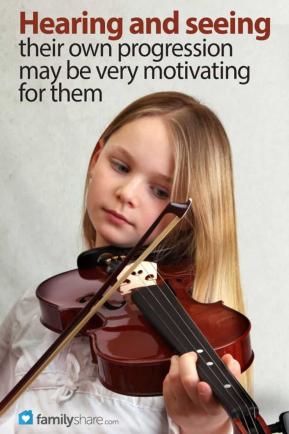
Recently an elderly man heard two of my children playing the piano. He expressed interest in their abilities and after a few niceties, said an oft heard line, "I have such a regret that I didn't keep practicing the piano like my mother wanted me to."�
My son found no motivation in the nice man's comment; instead he turned to me and said, "I would never regret it if I never played the piano ever again."�
My son is almost eleven. I'm a couple of years away from being forty. I see the big picture a little more clearly than he does, which is why he (and my other children) are required to practice music daily. Many days it is a struggle to get our children to practice without a fight, but believe it or not, lately things in the music department around here have run a little smoother.
I think these reasons may be helpful:
1. Be willing to compromise
Understand or decide why a child involved in music is important to you. This will likely be different for each child. For one, it may be a way to learn self-discipline. Another, may seek to fit with family tradition, or for another, it may be to bloom their natural talent. Perhaps, it will be a trade-off for another extra-curricular activity. Whatever the reason, it will help determine the level of intensity and priority the music lessons and practice are given.
2. Offer incentives
The potential of a music scholarship or one day marching with the high school band is not a goal (or reality) for every child involved in music. Determine what makes your child want to practice. Perhaps, the satisfaction of a well-learned piece of music, or a content music teacher, or a happy parent isn't enough. Offer money! Require music practice in exchange for extra-curricular activities they do love, or have a penalty of paying for the weekly music lesson if practicing isn't done. Again, consider how influential the involvement in music is to you, and incentivize accordingly. After a while, the incentives may be able to decrease as the child begins to love their music involvement more. (It happened to one of my children. With another, the incentives continue to be a must.)
3. Keep an open mind
My husband and I fought for almost two years with one of our children to play the piano. Lessons were a nightmare and practicing produced tears and contention. Yet, we both felt strongly that this child needed to have some musical involvement. After only two years of lessons, we allowed this child to stop taking lessons. However, he is still required to play the piano every day in exchange for participating in the activities of his choosing. He works at his own pace, he plays what he wants, and gets to choose how long to play. Adjusting my narrow-minded vision of all of my children enrolled in weekly piano lessons was life changing in our home.
4. Help them see the rewards of their efforts
Who doesn't like praise? Allow the children opportunities to perform for other people. Even the most basic version of Twinkle Twinkle Little Star will cause someone to smile. Encourage recitals, or playing while family or friends sing. Take the children to a rest home or allow them to play at a family party. Not only may their confidence increase, but they'll feel a sense of accomplishment for those seemingly endless hours of practice. Try recording their practice session sometime and then record it again months later. Hearing and seeing their own progression may be very motivating for them.
How you get your children to practice music without a fight may be very different from how I do it, but the general principles are the same. Our results will be varied. Some of our children may end up playing at Carnegie Hall, some may accompany a choir, some will receive a musical scholarship, and some will never touch an instrument, again, when they leave home.
At the end of the day, at least we'll be able to say we tried.

